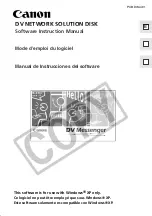
configure sys-health-check alarm-level
ExtremeWare Software 7.3.0 Command Reference Guide
649
The alarm-level and auto-recovery options are mutually exclusive; configuring an alarm-level disables
auto-recovery, and configuring auto-recovery overrides the alarm-level setting.
In ExtremeWare versions prior to 6.2, you cannot use both mirroring and the system health checker at
the same time. If you configure mirroring with the system health checker enabled, the health checker
will indicate that it has been disabled by sending a message to the syslog. In ExtremeWare 6.2 or later,
this restriction does not apply.
The
auto-recovery
option configures the number of times the system health checker attempts to
automatically reset a faulty module and bring it online. If the system health checker fails more than the
configured number of attempts, it sets the module to card-down. This threshold applies only to
BlackDiamond I/O modules.
In ExtremeWare 6.2.1 or later, when auto-recovery is configured, the occurrence of three consecutive
checksum errors will cause the packet memory (PM) defect detection program to be run against the I/O
module. Checksum errors may include internal and external MAC port parity errors, EDP checksum
errors, and CPU packet or diagnostic packet checksum errors. If defects are detected, the card is taken
offline, the memory defect information is recorded in the card EEPROM, the defective buffer is mapped
out of further use, and the card is returned to operational state. A maximum of 8 defects can be stored
in the EEPROM.
After the PM defect detection and mapping process has been run, a card is considered failed and is
taken offline in the following circumstances:
•
More than eight defects are detected.
•
Three consecutive checksum errors were detected by the health checker, but no new PM defects were
found by the PM defect detection process.
•
After defects were detected and mapped out, the same checksum errors are again detected by the
system health checker.
The auto-recovery repetition value is ignored in these cases. In any of these cases, please contact
Extreme Technical Support.
If you specify the
online
option, the module is kept online, but the following error messages are
recorded in the log:
<WARN:SYST> card_db.c 832: Although card 2 is back online, contact Tech. Supp. for
assistance.
<WARN:SYST> card_db.c 821: Card 2 has nonrecoverable packet memory defect.
To view the status of the system health checker, use the
show diagnostics
command.
To enable the health checker, use the
enable sys-health-check
command.
To disable the health checker, use the
disable sys-health-check
command.
The alarm-level
system-down
option is especially useful in an ESRP configuration where the entire
system is backed by an identical system. By powering down the faulty system, you ensure that erratic
ESRP behavior in the faulty system does not affect ESRP performance and ensures full system failover
to the redundant system.
If you are using ESRP with ESRP diagnostic tracking enabled in your configuration, the system health
check failure will automatically reduce the ESRP priority of the system to the configured failover
priority. This allows the healthy standby system to take over ESRP and become responsible for handling
traffic.
Summary of Contents for ExtremeWare 7.3.0
Page 54: ...54 ExtremeWare Software 7 3 0 Command Reference Guide Contents...
Page 104: ...104 ExtremeWare Software 7 3 0 Command Reference Guide Commands for Accessing the Switch...
Page 378: ...378 ExtremeWare Software 7 3 0 Command Reference Guide FDB Commands...
Page 418: ...418 ExtremeWare Software 7 3 0 Command Reference Guide QoS Commands...
Page 436: ...436 ExtremeWare Software 7 3 0 Command Reference Guide NAT Commands...
Page 600: ...600 ExtremeWare Software 7 3 0 Command Reference Guide SLB Commands...
Page 968: ...968 ExtremeWare Software 7 3 0 Command Reference Guide Security Commands...
Page 1002: ...1002 ExtremeWare Software 7 3 0 Command Reference Guide EAPS Commands...
Page 1126: ...1126 ExtremeWare Software 7 3 0 Command Reference Guide ESRP Commands...
Page 1392: ...1392 ExtremeWare Software 7 3 0 Command Reference Guide IGP Commands...
Page 1478: ...1478 ExtremeWare Software 7 3 0 Command Reference Guide BGP Commands...
Page 1556: ...1556 ExtremeWare Software 7 3 0 Command Reference Guide IP Multicast Commands...
Page 1600: ...1600 ExtremeWare Software 7 3 0 Command Reference Guide IPX Commands...
Page 1616: ...1616 ExtremeWare Software 7 3 0 Command Reference Guide ARM Commands...
Page 1694: ...1694 ExtremeWare Software 7 3 0 Command Reference Guide PoS Commands...
Page 1750: ...1750 ExtremeWare Software 7 3 0 Command Reference Guide T1 E1 and T3 WAN Commands...
Page 1856: ...1856 ExtremeWare Software 7 3 0 Command Reference Guide MPLS Commands...
Page 1898: ...1898 ExtremeWare Software 7 3 0 Command Reference Guide High Density Gigabit Ethernet Commands...
Page 1938: ...1938 ExtremeWare Software 7 3 0 Command Reference Guide Power Over Ethernet Commands...
Page 1988: ...1988 ExtremeWare Software 7 3 0 Command Reference Guide H VPLS Commands...
Page 2106: ...2106 ExtremeWare Software 7 3 0 Command Reference Guide Wireless Commands...
Page 2132: ...2132 ExtremeWare Software 7 3 0 Command Reference Guide Configuration and Image Commands...
Page 2236: ...2236 ExtremeWare Software 7 3 0 Command Reference Guide Troubleshooting Commands...
Page 2254: ...2254 ExtremeWare Software 7 3 0 Command Reference Guide Index of Commands...
















































